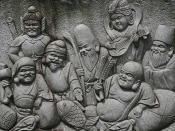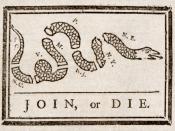From the dawning of man, all the way to the second millennium, you will come upon wars, reforms and conflicts all having to do with religion. One of the most influential religious revivals of all time, and especially in our nation's history, was the Great Awakening. The Great Awakening revived the recognition of religious importance that had once been present in the seventeenth century.
What historians call "the first Great Awakening" can best be described as a revitalization of religious piety that swept through the American colonies between the 1730s and the 1770s. The Protestant cultures during the middle decades of the eighteenth century, reaffirmed the view that being truly religious meant trusting the heart rather than the head, prizing feeling more than thinking, and relying on biblical revelation rather than human reason. Jonathan Edwards, sometimes known as the postmillennialist's postmillennialist, is best known for his role in the Great Awakening, which began as a revival in several churches along the Connecticut River Valley.
Through his preaching, revivalistic ferver spread like wildfire throughout the colonies.
Religious enthusiasm quickly spread from the Presbyterians of the Middle Colonies to the Congregationalists (Puritans) and Baptists of New England. It began among the young people who had been drifting away from the church. If a nation is to be revived spiritually, then it must first start with the younger generation of people. Why the younger generation? It is because young people are not fixed-minded or corrupt like older people. Young people tend to be learning and pure in their desires. Acts 2:17 says, ``In the last days, God says, I will pour out my Spirit on all people. Your sons and daughters will prophesy, your young men will see visions....'' Young people, especially those of college age are best suited for...


